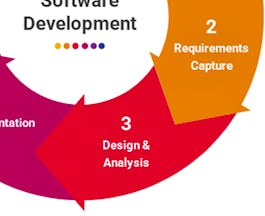Filter by
The language used throughout the course, in both instruction and assessments.
Choose the Software Project Management Course That Aligns Best With Your Educational Goals

University of Alberta
Skills you'll gain: Software Engineering, Agile Software Development, Product Management, Design and Product, Leadership and Management, Project Management, Planning, Application Development, Product Design, Entrepreneurship, Strategy and Operations, Business Analysis, Collaboration, User Experience, Scrum (Software Development), Supply Chain and Logistics

Skills you'll gain: Project Management, Strategy and Operations, Leadership and Management, Communication, Business Communication, Collaboration, Agile Software Development, Software Engineering, Entrepreneurship, Scrum (Software Development), Planning, Supply Chain and Logistics, Change Management, Finance, Organizational Development, Product Management, Risk Management, Budget Management, Influencing, Culture, Emotional Intelligence, People Management, Problem Solving, Procurement

Skills you'll gain: Software Engineering, Agile Software Development, Computer Programming, Software Engineering Tools, Application Development, Programming Principles, Software Architecture, Communication, Cloud Applications, Full-Stack Web Development, Scrum (Software Development), User Experience Design, Leadership and Management, Project Management, Business Analysis, Cloud Computing, IBM Cloud, Information Technology, Operating Systems, Python Programming, Risk Management

Google
Skills you'll gain: Agile Software Development, Software Engineering, Project Management, Scrum (Software Development), Strategy and Operations, Collaboration, Leadership and Management, Communication, Entrepreneurship, Product Management, Influencing, Problem Solving

University of Alberta
Skills you'll gain: Agile Software Development, Software Engineering, Design and Product, Leadership and Management, Planning, Product Management

The Hong Kong University of Science and Technology
Skills you'll gain: Software Architecture, Systems Design, Software Engineering Tools, Agile Software Development, Human Computer Interaction, Product Design, Research and Design, Software Testing, Software-Defined Networking, Project Management, Software Engineering

University of Minnesota
Skills you'll gain: Agile Software Development, Application Development, Collaboration, Continuous Delivery, Design and Product, Estimation, Planning, Project Management, Scrum (Software Development), Software Engineering, Leadership and Management
 Status: Free
Status: FreeAtlassian
Skills you'll gain: Agile Software Development, Leadership and Management, Planning, Product Development, Product Management, Project Management, Scrum (Software Development), Software Engineering, Software Testing, Technical Product Management, Jira (Software)

Coursera Project Network
Skills you'll gain: Computer Graphics, Writing

Coursera Project Network
Skills you'll gain: Project Management, Scrum (Software Development), Software Engineering

Coursera Project Network
Skills you'll gain: Marketing, Mobile Development, Web Development

West Virginia University
Skills you'll gain: Network Security, Risk Management
Searches related to software project management
In summary, here are 10 of our most popular software project management courses
- Software Product Management: University of Alberta
- Google Project Management:: Google
- IBM IT Project Manager: IBM
- Agile Project Management: Google
- Introduction to Software Product Management: University of Alberta
- Software Engineering: Software Design and Project Management: The Hong Kong University of Science and Technology
- Agile Software Development: University of Minnesota
- Agile with Atlassian Jira: Atlassian
- Build a Professional Resume using Canva: Coursera Project Network
- How to create a Jira SCRUM project: Coursera Project Network










